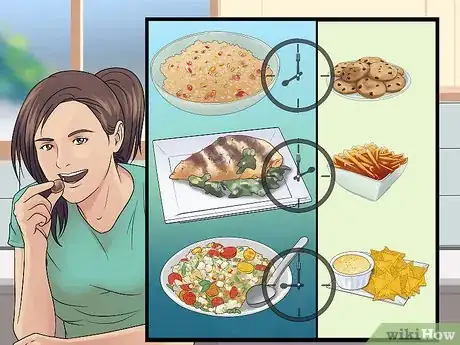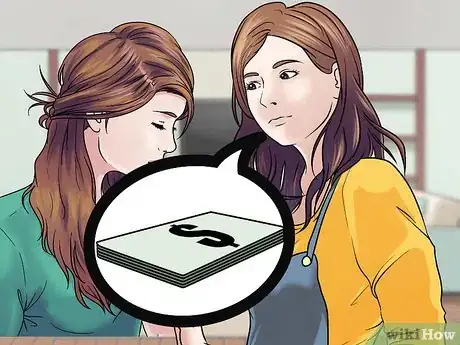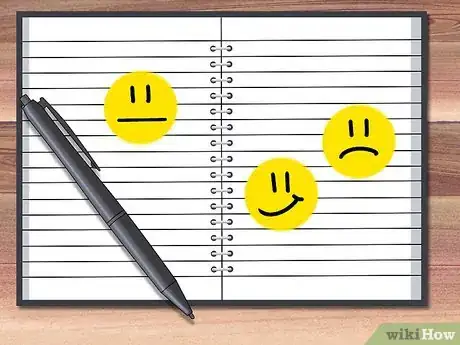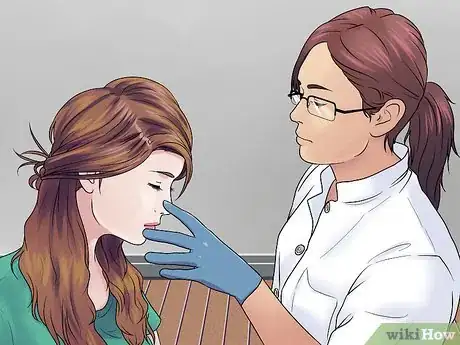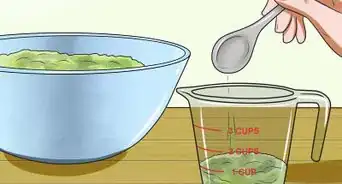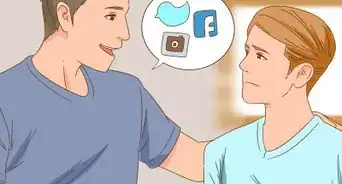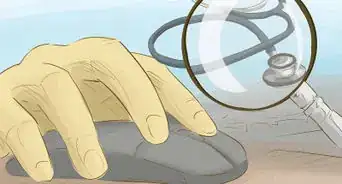This article was co-authored by Mindy Lu, LMHC, CN. Mindy Lu is a Certified Nutritionist (CN), Licensed Mental Health Counselor (LMHC), and the Clinical Director of Sunrise Nutrition, a nutrition and therapy group practice in Seattle, Washington. Mindy specializes in eating disorders, body image concerns, and chronic dieting. She holds an MS in Nutrition and Clinical Health Psychology from Bastyr University. Mindy is a Licensed Counselor and Nutritionist and is known for her warm therapeutic style and culturally-inclusive lens in healing. She is a member of the Multicultural Counselors of Washington State and the Association for Size Diversity and Health.
There are 22 references cited in this article, which can be found at the bottom of the page.
This article has been viewed 86,592 times.
The cycle of binge-eating (eating excessive amounts of food), feeling guilty and wanting to undo what you have eaten, and then purging (making yourself vomit) is a serious condition. Both diagnoses of bulimia nervosa and anorexia nervosa can involve purging behaviors. Even if you do not binge or overeat beforehand, vomiting up your food is a very unhealthy cycle. However, once it is broken, you can start the road to recovery.[1] [2] If you feel like you are constantly fighting the desire to purge after a meal, you can benefit from seeking professional help, creating a healthy eating pattern, practicing self-help strategies, and using coping techniques.
Steps
Creating a Healthy Eating Pattern
-
1Focus on having a healthy body and weight. Understand that purging will not help you healthfully lose weight. This is very important to understand. What you are actually doing is making yourself dehydrated, which can lead to feeling like you have an ‘empty’ stomach. Being dehydrated can lead to more binge eating and cravings. This means that you might not be really losing the weight that you think you’re losing by throwing up your meals.
- Purging can cause major dental issues because the bile that comes up when you vomit can literally eat away your teeth.[3] Purging can also result in salivary glands swelling up noticeably, damage or bleeding in the esophagus, and even cancer.[4]
- Purging does not help you lose weight as much as you think it does because it does not remove all of the calories you ate. In fact, purging can actually lead to weight gain due to overeating and believing that you have "a way out" if you eat too much food.
- If you excessively exercise on top of purging, you should be aware that your body needs more calories to compensate for those that it burns when you exercise. Because of this, you’ll feel a stronger urge to binge eat, rather than just eat normally.
-
2Adopt an eating schedule. Making a plan about the type and amount of food you want to eat at every meal will help to keep you on a regular eating schedule that will not make you feel like you have to purge. This can also help reduce your impulse to binge and purge because you are sticking to a plan instead of thinking about what to do in the moment. Put the schedule on the fridge or near your dining room table so that you can remind yourself that you are only eating what you have written out, rather than binging.[5]
- Know that you can healthily lose weight through exercise and lowering your overall calories intake. However, this does not mean you have to starve yourself. Weight loss is gradual and should not be done quickly as this is unhealthy for your body.
- If you feel comfortable, ask your family or housemates to help you stay on track by also being aware of your food schedule and helping you stick to it.
Advertisement -
3Eat three meals and three snacks every day. It will help if you create a timetable and select times to eat your three meals and three snacks. While this might sound scary because it sounds like eating more throughout the day could make you gain weight, this is just not true. Eating small items six times a day actually boosts your metabolism and helps you lose weight.[6]
- An example meal schedule based on a 2,000 calorie diet would be:
- 8:00AM: Wake up.
- 9:00AM: Breakfast. (approx. 500 calories)
- 11:00AM: Mid-morning snack. (approx. 150 calories)
- 1:00PM: Lunch. (approx. 500 calories)
- 3:30PM: Mid-afternoon snack. (approx. 200 calories)
- 6:00PM: Dinner. (approx. 500 calories)
- 8:00PM: Nighttime snack. (approx. 150 calories)
- 11:30PM: Bed.
- Choose low-calorie foods that you will feel good about eating when you first try to stop binging and purging.
- Give yourself time to eat and chew slowly; doing this will help you to recognize when you feel full and can stop eating.
- An example meal schedule based on a 2,000 calorie diet would be:
-
4Create a healthy eating environment. Your environment (before, during, and after you eat) is integral to successfully reducing your purging pattern.[7] For example, being around loved ones after you eat a meal can help keep you from visiting the bathroom to purge.[8]
- If you can, ensure that you are not around individuals who binge and purge or have eating disorders while you eat. This can trigger you and enable you to think that it is a good choice to purge.
- Do something with a loved one, like going for a walk after a meal, watching a movie, or just sitting around chatting. Let your loved ones distract you from the desire to purge.[9]
- Other ideas for what you can do after meals include: taking your dog for a walk, calling up a friend until the urge to go to the bathroom passes, or playing a game with family members or friends.
-
5Make a food contract. Make a contract with your family or mental health professional that will help you to break out of the binge-purge cycle. Having this contract, and the support of your family, will help you to gain control of your urges and feelings of guilt.
- Work together to decide what reward you should get when you follow your eating schedule, and also come up with what you will do if you go off your schedule or purge.
- For example, if you stay on your schedule for a week, your reward could be the money to buy those shoes you’ve had your eyes on. If you break your schedule or purge, then you could ask your family to take away your phone for a day. Do this only if it works for you and doesn't lead to secretive behavior (where you hide or conceal your purging in order to reduce negative consequences).
Practicing Self-Help Strategies to Reduce Purging
-
1Practice self-love daily. It is important to remind yourself of how great you are as often as possible if this helps you.[10] No person can be perfect, so instead of trying to attain perfection be really happy about the wonderful person that you are. Every day, you should:
- Love yourself for who you are.
- Respect yourself for what you have achieved so far in life.
- Remind yourself of what your goals are and what you are capable of achieving in the future. Perhaps make a list of your goals for 1 month, 6 months, and 1 year from now. Look at these goals each day and make sure you are working toward them.
-
2Focus on your strengths. Consider your strengths, talents, achievements, contributions, and accomplishments. These are things that should define you—not your body type or image. You can also think about the things in life that you are grateful for, be it a loving best friend, a great job, or the amazing family that supports you.[11]
- Make a list of all of your strengths and accomplishments and put it somewhere where you can see it every day.
- Make a list of the things you are grateful for. These things can help to remind you of how good your life really is.
- Participate in activities relating to your strengths. For example, if you are a good writer, you can cultivate this strength by continuing to practice writing articles, stories, or even in a journal.
- Always remember that you are not your eating disorder.[12]
-
3Keep a journal. It can really help to write your emotions and thoughts down, especially when you are trying to overcome the purging cycle. Write down all of the things that make you want to purge, as well as all of the reasons why you want to stop purging. Along with these things you should write down[13] :
- Your thoughts about the anxieties or feelings of guilt that make you want to purge.
- Moments of strength when you overcame the desire to purge. You can reread these moments of success to give you strength in times of relapse.
- Your goals. When you lose sight of them, you can revisit your journal entries and remind yourself of what you are working towards.
-
4Create a support system for yourself. Working to overcome this condition by yourself can be lonesome and frustrating. Because of this, it’s important to create a support system for yourself. Lack of social support is also a significant risk factor in developing issues with eating such as purging. Therefore, it is crucial to make sure you have a strong sense that you are socially supported.
- The best way to do this is by talking to family members or friends about what you are going through and asking them to help you. They can help you stick to your eating schedule and will help distract you after meals.
- Try going on outings with your friends and loved ones. You might take an art class together, go horseback riding, or do some other activity that you enjoy.[14]
-
5Join a community support group. Aside from your family and friends, it can also help to go to community support groups where you can meet and talk to people going through the same thing as you. Support groups can: give you an opportunity to listen to stories about what people like you are going through, help you find motivation through other people’s successes, and offer an opportunity to get valuable directions, insights, guidance, and advice from people who know what it is like and will not judge you for it.
- Your therapist can help point you in the direction of a local support group, or you can do your own research online to find a group near you.
- Consider trying a 12 step program for eating disorders and see if you like it. There are even Eating Disorders Anonymous (EDA) websites and groups.[15]
-
6Read success stories that will help you stay motivated. Reading about others people’s success with overcoming the desire to purge can help motivate you to break your own cycle. Learn how they stopped purging and try some of their techniques. Understand that everyone is different, so you will have to adopt the techniques that work best for you, but the way to do that is to try things that other people have found helpful.
- Go to a bookstore and purchase a book on success stories about overcoming the binge-purge cycle.
- Look up interviews with people who have overcome bulimia online.
Using Coping Tools to Deal with Triggers to Purge
-
1Keep yourself occupied with things that you love. When you are focusing on things that you love, you will have less time to focus on the desire to purge. It is especially important to keep yourself distracted after you have eaten a meal. Some other things that you can focus on include:
- Reading a book or watching a movie.
- Pursuing your favorite hobby. If you don’t have a hobby, find one that is tailored to your interests.
- Do mental games like crosswords, sudoku, and puzzles.
- Put your heart into learning something new, be it a skill or a subject like chemistry.
-
2Become a volunteer. Volunteering is a great way to focus on constructive things, rather than on your desire to purge. It is also an opportunity to see the lives of others and put your own in perspective. What you learn while volunteering might help you to analyze the reasons why you purge, and may help you overcome them. Places to volunteer include:
- At a local women’s shelter.
- At a food service, like a soup kitchen, that serves the homeless and poor. Seeing people grateful to eat food can be therapeutic.
- At an orphanage.
- At an animal shelter.
-
3Get plenty of exercise. When you exercise, chemicals like serotonin get released in your brain, lifting your mood and making you feel great about yourself. Exercising is also good because, when done in moderation rather than excessively, it can help you stop purging if you purge to lose weight. Exercising regularly keeps you fresh, energetic, and active. In turn, these things can make you feel more confident and happier.[16]
- You should try to exercise for at least 30 minutes for four to five days out of the week. This can be accomplished through walking, running, swimming, biking, hiking, rock climbing—you name it.
- Avoid exercising excessively. Some signs you may be exercising too much include if you engage in strenuous exercise daily or multiple times a day, or if you exercise upwards of 15 hours per week.[17]
-
4Practice yoga and meditation. Behaviors such as purging are usually a result of a pile up of feelings, emotions and mental energies that are seeking an outlet. Yoga and meditation can ensure the smooth release of these mental energies, feelings and emotions in such a manner that you can combat the negativity in your life and give them an outlet in a constructive manner. Yoga and meditation can help your mind to regain its composure and overcome the desire to think negatively and purge.[18] Both practices can help you to see the beauty that lies within you.
- When practicing yoga, you focus your entire being on your breath and the movement of your body. There are poses (which are called asanas) that can be tailored to those suffering from an eating disorder.[19] [20] These poses help you to sow the seeds of inner strength and explore your potential. One example of a pose is Goddess Pose, which is your legs bent, knees turned out, and arms up.[21]
-
5Consider getting a pet. You purge for psychological reasons, not because your body needs to do so. These psychological reasons can include anxiety, guilt, stress, and depression. When you have a pet to look after and care for, these feelings are often relieved because you are putting your energy towards loving and caring for another being. Pets are capable of altering our emotions and behaviors—the unconditional love of a pet is a powerful thing. Pets can also serve as a great distraction from the negative thoughts that lead to purging.[22]
- If you can’t get a pet, you could consider volunteering at a humane society where you can play with the animals that also want love and affection.
Seeking Professional Help
-
1Explore options for help. Understand that self-help alone may not be enough to overcome the desire to purge. Professional help, in combination with the other methods listed here, is the most beneficial way to overcome this condition. A professional can help you to create a plan tailored to your specific needs.[23]
- Cognitive Behavioral Therapy (CBT) is an effective therapy modality for reducing purging behaviors.[24] CBT is about changing your thoughts in order to change your feelings (anxiety, guilty, worry, depression) and behaviors (purging).
-
2Talk to a therapist. A therapist can help you understand that purging is not the solution to resolve weight problems nor the right coping mechanism to deal with issues such as anxiety, depression, frustration, anger, hopelessness and low self-esteem. Therapists are typically non-judgmental and safe individuals to confide in regarding your purging behaviors.
- You can look up a therapist that specializes in eating disorders online, or you can talk to a family member or trusted doctor who can help you to find someone that will fit your needs best.
-
3Seek the help of more than one professional. Your treatment does not necessarily need to consist of only one therapist. Many people who experience an eating disorder actually work with multiple professionals to help create a meal schedule and plan of action that works. These professionals can include:
- Physicians, counselors, psychiatrists, psychologists/therapists, and nutritionists (dietitians).
-
4Consider medication. There are different medications, including antidepressants, that have been shown to reduce symptoms of binging and purging.[25] However, medication is typically not enough to treat purging behaviors. The best treatment is usually a combination of medication and therapy.[26]
- Consult with your medical doctor to get a referral to a psychiatrist in your area. Or, you can contact your insurance company or conduct an online search for low-cost mental health clinics in your area.
- While, medical doctors (MDs, general practitioners) can typically prescribe medications for mental health concerns, psychiatrists are specifically trained in mental health disorders and specialize in these types of medications.
Warnings
- If you think that your purging has gone too far but you can’t seem to stop, seek professional help or tell a loved one who can get you the help you need. You might be endangering your own life if you do not seek help.⧼thumbs_response⧽
References
- ↑ https://www.nationaleatingdisorders.org/cant-stop-purging
- ↑ http://www.getselfhelp.co.uk/bulimia.htm
- ↑ https://www.researchgate.net/profile/Esteban-Bonilla-2/publication/11851765_Oral_rehabilitation_of_a_bulimic_patient_A_case_report/links/5482988c0cf2e5f7ceac5224/Oral-rehabilitation-of-a-bulimic-patient-A-case-report.pdf
- ↑ http://www.bulimiahelp.org/articles/bulimia-and-cancer-what-you-need-know
- ↑ http://waragainsteatingdisorder.wordpress.com/2013/05/23/10-ways-to-stop-purging-after-meals/
- ↑ http://www.bulimiahelp.org/book/info/creating-meal-plan-bulimia-recovery
- ↑ http://www.mirror-mirror.org/purging-disorder.htm
- ↑ http://www.sciencedirect.com/science/article/pii/S0005796702000888
- ↑ http://www.sciencedirect.com/science/article/pii/S0005796702000888
- ↑ http://www.spring.org.uk/2014/06/i-am-a-lovable-person-why-positive-mantras-backfire-for-some.php
- ↑ http://www.eatingdisorderhope.com/recovery/self-help-tools-skills-tips
- ↑ Mindy Lu, LMHC, CN. Certified Nutritionist & Licensed Counselor. Expert Interview. 21 October 2020.
- ↑ http://www.eatingdisorderhope.com/recovery/self-help-tools-skills-tips
- ↑ Mindy Lu, LMHC, CN. Certified Nutritionist & Licensed Counselor. Expert Interview. 21 October 2020.
- ↑ http://www.eatingdisordersanonymous.org/
- ↑ http://www.healthyweightnetwork.com/size1.htm
- ↑ http://www.berkeleywellness.com/fitness/exercise/article/hazards-too-much-exercise
- ↑ http://www.bodypsychyoga.com/Downloads/How%20Can%20Yoga%20be%20Helpful%20in%20Recovery%20from%20an%20Eating%20Disorder.pdf
- ↑ http://www.yogabasics.com/learn/eating-disorders/
- ↑ http://www.tandfonline.com/doi/full/10.1080/21662630.2013.862369?mobileUi=0&
- ↑ http://www.indianmirror.com/games/yoga/yoga-anorexia.html
- ↑ http://www.psychologytoday.com/blog/the-first-impression/201303/pet-ownership-and-mental-health-0
- ↑ http://www.nimh.nih.gov/health/publications/eating-disorders/index.shtml
- ↑ http://archpsyc.jamanetwork.com/article.aspx?articleid=481603
- ↑ https://www.researchgate.net/profile/Ora-Nakash/publication/11260156_A_Multidimensional_Meta-Analysis_of_Pharmacotherapy_for_Bulimia_Nervosa_Summarizing_the_Range_of_Outcomes_in_Controlled_Clinical_Trials/links/02bfe510a968037cef000000/A-Multidimensional-Meta-Analysis-of-Pharmacotherapy-for-Bulimia-Nervosa-Summarizing-the-Range-of-Outcomes-in-Controlled-Clinical-Trials.pdf
- ↑ https://www.researchgate.net/profile/Ora-Nakash/publication/11260156_A_Multidimensional_Meta-Analysis_of_Pharmacotherapy_for_Bulimia_Nervosa_Summarizing_the_Range_of_Outcomes_in_Controlled_Clinical_Trials/links/02bfe510a968037cef000000/A-Multidimensional-Meta-Analysis-of-Pharmacotherapy-for-Bulimia-Nervosa-Summarizing-the-Range-of-Outcomes-in-Controlled-Clinical-Trials.pdf


